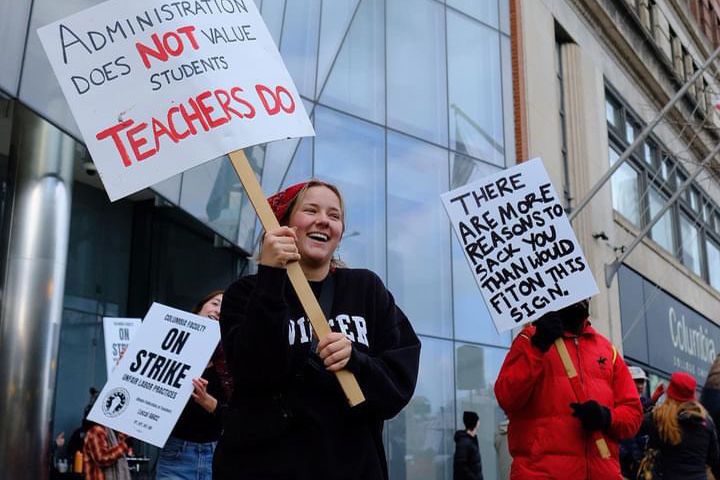Columbia College is a school renowned for its courses in film, music, art, fashion and communications right in the heart of Chicago’s art district. It hides a 20 million dollar deficit, controversial treatment of part-time faculty and a union demanding the ousting of its current President Kwang-Wu Kim, healthcare, budget transparency and job security.
In the midst of all this, ambitious artists and even MCHS alumni are on the losing end.
Columbia College’s financial woes are nothing new. The deficit, while not necessarily abnormal for an institution like Columbia, has been an issue. However, what caused the controversy and strike has been President Kim’s handling of the situation.
To combat the deficit, part-time faculties are being slighted out of healthcare and job security, class sizes are being increased and upwards of hundreds of courses are being cut.
The CFAC Union (Columbia Faculty) have protested at President Kim’s addresses, attempted to bargain with the administration, and over the past weekend a majority of staff voted in favor of striking until their demands are satisfied.
Striking began on Oct. 30, with demands including immediate removal of President Kim and his cabinet, a halt on anti-union efforts, financial responsibility, tuition freeze during this time and change in administration priorities.
These demands, as laid out on the CFAC instagram, were originally to be negotiated “in good faith” on Oct. 25. When a solution was not reached, voting began, and the strike was set in stone in the “highest turnout for a faculty vote ever,” 88% voted in favor of a strike.
This strike has a mixed effect on the students of Columbia College. The union’s demands do support the students, but the strike halts all classes taught by union members, leaving students with a lack of education that they are presently paying for with no tuition freeze.
Many of these students are MCHS Alumni, like Orian Angel Roman, who sang his support for the union.
“I think while their demands seem pretty high right now, they are in a spot where they have to be.”
He drew comparisons between this strike and the current writers/actors strike that is sweeping the nation.
“I think it is important for us to fight for our jobs and each other’s jobs in the industry.”
Recent MCHS graduate and current Columbia student Kennedy Tetour explained both sides of the effect this situation has on students, stating “Administration made it clear that they intend to cut hundreds of classes and raise class sizes. Not only that, they have indicated that they want to raise tuition prices as well.”
Furthermore, Tetour explained how the strike itself could negatively affect students. “Some of our classes will be put on pause and some of them are moving to asynchronous or virtual classes, which is hard to do with art classes.”
However, according to the Columbia College Chronicle, asynchronous classes will not even be available.
“The part-time faculty union is telling all instructors that they must participate in the strike that starts October 30th – regardless of if they are full voting members of the union – or they will be subject to discipline.”
Now that classes will be halted entirely, the effect this has on students is undeniable. Despite this the union still asks for students’ support, with an Instagram post requesting student guest speakers at their strike.
“I have been seeing a lot of friction between our student government and the student body since they have put up a statement distancing themselves from the demonstration, but I think that aggression is being focused in the wrong place,” said Roman.
“This strike could be a means of (making significant change), but at the very least it is a start in the right direction of reclaiming the college that we signed up for.”
The ongoing strife between the union and administration sees students, many of which you may know, getting caught in the crossfire. Tensions are only rising, and it does not seem that an end will be reached soon.
The union still beckons for student body support, and is still in its demands.




